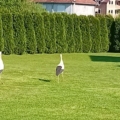In a world where hustle and bustle are often celebrated, Montenegro offers a refreshing and humorous take on relaxation with its traditional “laziest citizen” competition. This light-hearted event, known as the “long bedtime” challenge, recently took place in the picturesque Ethno village of Brezna, situated near the historic city of Niksic.
The competition, which saw a record participation of 21 individuals this year, is not just about fun and games. With a prize of 1000 euros ($1086.56) at stake, participants vie for the coveted title of Montenegro’s “laziest citizen.” But what’s the story behind this unique contest?
Mico Blagojevic, the brainchild behind the event, shed some light on its origins. He revealed that the competition was initiated 12 years ago as a tongue-in-cheek response to myths and stereotypes suggesting that Montenegrins are inherently “lazy.” This stereotype, while humorous, can be traced back to cultural references like the Montenegrin Commandments, a set of humorous “commandments” that playfully exaggerate the Montenegrin way of life, emphasizing leisure and relaxation.
One of the standout participants this year was Dubravka Aleksic, who holds an impressive record of 117 hours of continuous bedtime set in 2021. The rules of the competition are simple yet challenging. Participants are allowed to sleep, eat, drink, read books, and even use their phones. However, standing up is strictly prohibited, and they can only cater to personal needs every 8 hours.
This competition, while entertaining, also serves as a reminder of the importance of taking a break and enjoying life’s simpler pleasures. In a world that often values constant activity, Montenegro’s “laziest citizen” contest is a testament to the nation’s unique cultural identity and sense of humor.
Note: The Montenegrin Commandments are a set of humorous guidelines that playfully depict the Montenegrin way of life. They are not religious or official in nature but are often cited in jest to highlight the country’s laid-back attitude.






